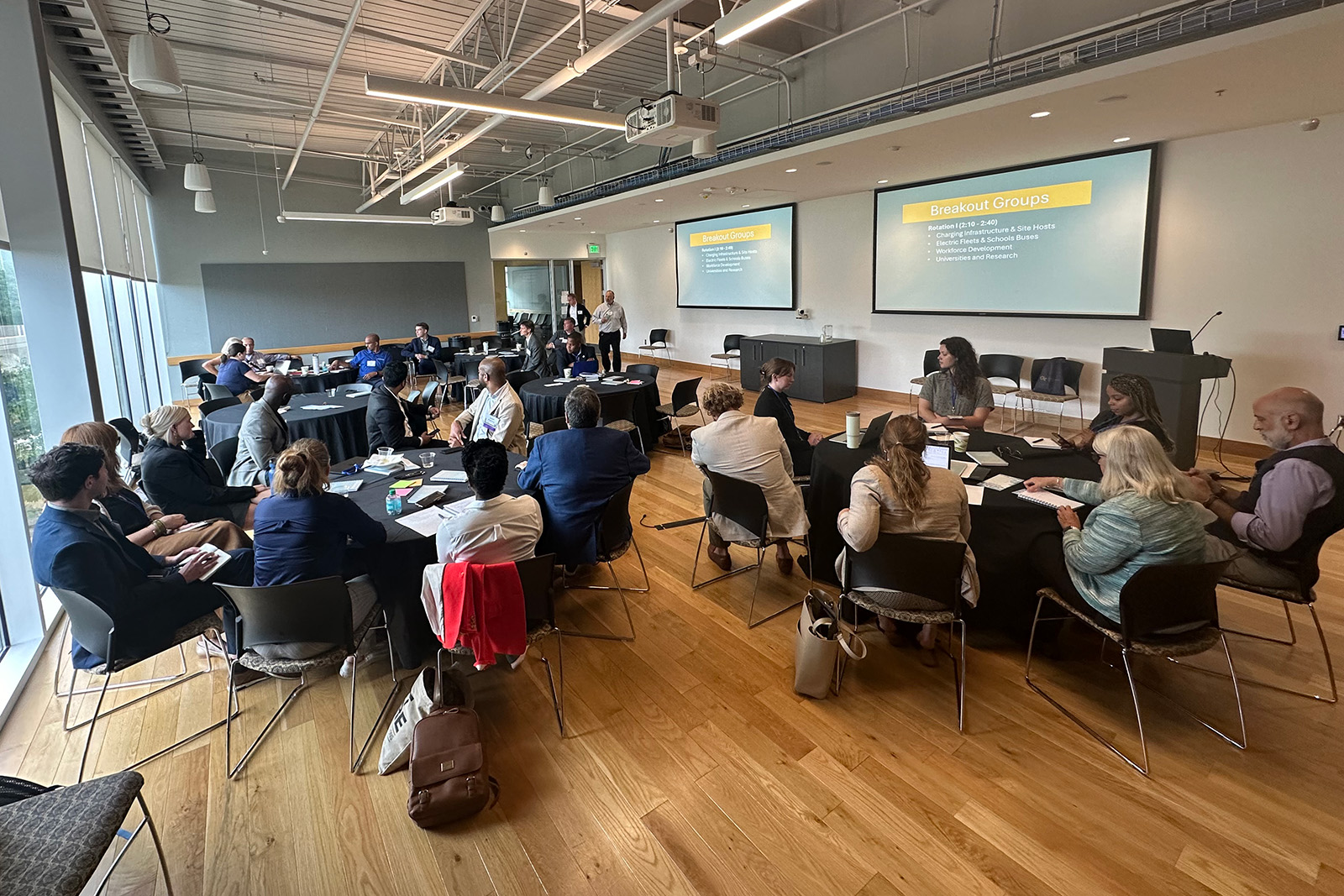Multisector Leaders Convene to Advance Transportation Electrification in the Southeast
More than 70 representatives from government agencies, automakers, utilities, universities, nongovernmental organizations and more met in Atlanta and virtually in June to share project updates and challenges about electric mobility in the Southeast.
The gathering was the first in-person meeting of the Southeast Electric Transportation Regional Initiative (SETRI) since it launched in 2021. SETRI is a multisector network—facilitated by Duke University’s Nicholas Institute for Energy, Environment & Sustainability, the Georgia Tech Strategic Energy Institute and key partners—that seeks to convene, collaborate and inform on transportation electrification across the region.
“To advance an equitable transition to electric transportation in the Southeast, we need to work together across communities, companies and campuses throughout the region,” said Trey Gowdy, research lead at the Nicholas Institute. “Our goal is for SETRI to advance such collaborations and foster information-sharing across sectors and states.”
Here are five key takeaways from the meeting (and see full details in the presentation slides):
1. Electric vehicle (EV) charging infrastructure and vehicle adoption are growing.
Annual sales of plug-in hybrids and EVs quadrupled nationally from 2020 to 2023, according to the federal Joint Office of Energy and Transportation. A representative of the Joint Office highlighted federal funding across the Southeast to support EV infrastructure, including tens of millions in grants for interstate and community charging. Automaker Rivian reported on progress and lessons learned for installing charging stations in largely rural areas at state parks in Tennessee, North Carolina, South Carolina and Georgia. The Atlanta Regional Commission discussed a project to install about 300 free Level 2 charging ports in the metropolitan area.

2. Collaboration is taking place across the Southeast.
Speakers highlighted numerous collaborative efforts and converging networks that are laying the foundation to advance transportation electrification within states and across the region. Examples include:
- The STRIDE (Southeastern Team Reducing the Impacts of Diesel Emissions) Collaborative, coordinated by the U.S. Environmental Protection Agency and partners, to reduce regional transportation-related diesel emissions
- The Georgia Clean Cities Coalition’s work to expand coalitions to new parts of the region
- The South Carolina Electric Transportation Network’s work to foster information-sharing across the state’s EV public and private sectors
- The Electrification Coalition’s rural roundtable series to advance understanding of case studies, technical resources and challenges for rural communities adopting EVs
- The Electrify the South Local Government Collaborative, a program of the Southern Alliance for Clean Energy that provides tools and events for municipalities advancing transportation electrification
3. Innovative workforce development and education programs are being developed.
Trident Technical College in South Carolina is working on a curriculum that includes virtual and augmented reality components to train EV technicians. The University of Kentucky's Gen-EV STEM program provides elementary school students with the opportunity to learn how to build and race electric cars. The Greater Washington Clean Cities Coalition highlighted the multi-organizational GUMBO (Guaranteeing Access to Underserved and Marginalized Populations by Building Employment Opportunities) workforce development initiative that will develop a curriculum for EV charging station installation to instruct operators and technicians.
4. Resources are available to assist with EV adoption.
The Joint Office of Energy and Transportation offers funding programs and technical assistance, such as the interactive Public EV Charging Infrastructure Playbook and Charging and Fueling Infrastructure (CFI) grant opportunity. The World Resources Institute has a School Bus Ambassadors program for school districts interested in learning how to implement electric school buses. The Electrify the South Collaborative maintains a directory of resources on its website from fleets to infrastructure. Please follow the link below to SETRI’s own portal for a more complete listing of resources and announcements.
5. More consumer education is needed.
In breakout sessions, participants mentioned the need for greater consumer education to aid in vehicle purchasing decisions, charging infrastructure and other EV topics. Speakers highlighted upcoming events, including conferences, stakeholder meetings and ride-and-drive events taking place this fall.
More About SETRI
Stay connected with SETRI!
► Information about the next virtual SETRI meeting on Sept. 10, 2024.
► Sign up for the SETRI email list for regular updates.
The Nicholas Institute, Georgia Tech Strategic Energy Institute and SETRI partner organizations are collaborating to advance transportation electrification through regular convenings such as this meeting, resources like the Southeast Portal for Electric Transportation Opportunities and data-driven research.
“Georgia Tech was delighted to host SETRI's 2024 in-person meeting,” said Richard Simmons, Ph.D., director of research and studies at the Georgia Tech Strategic Energy Institute. “SETRI is adding value and accelerating timely exchanges across the EV value chain from batteries to electric buses, and from federal funding to smart grid innovation throughout the Southeast.
“This voluntary coalition has grown from a roundtable of a dozen individuals four years ago to upwards of 100 dynamic, trend-setting organizations today. It's exciting to play a small part in providing a forum for this partnership, and to imagine its trajectory and impact over the coming years.”
Funding support for this event was provided by the U.S. Energy Foundation.



